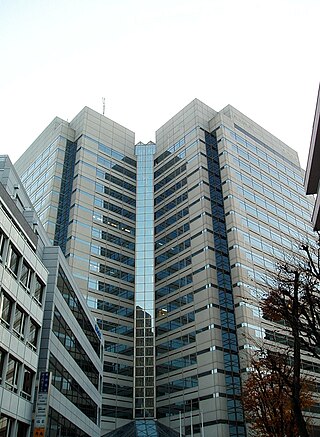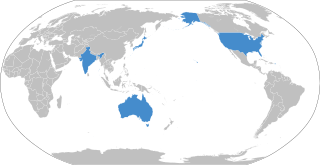
The International Energy Agency (IEA) is a Paris-based autonomous intergovernmental organisation, established in 1974, that provides policy recommendations, analysis and data on the global energy sector. The 31 member countries and 13 association countries of the IEA represent 75% of global energy demand.

Rockwell Automation, Inc. is an American provider of industrial automation and digital transformation technologies. Brands include Allen-Bradley, FactoryTalk software and LifecycleIQ Services.

Major non-NATO ally (MNNA) is a designation given by the United States government to countries that have strategic working relationships with the U.S. Armed Forces while not being members of the North Atlantic Treaty Organization (NATO). While the status does not automatically constitute a mutual defense pact with the United States, it does confer a variety of military and financial advantages that are otherwise unobtainable by non-NATO countries. There are currently 19 major non-NATO allies across four continents: 11 in Asia, 3 in Africa, 3 in South America, and 2 in Oceania.
The International Framework for Nuclear Energy Cooperation (IFNEC) is a forum of states and organizations that share a common vision of a safe and secure development of nuclear energy for worldwide purposes. Formerly the Global Nuclear Energy Partnership (GNEP), IFNEC began as a U.S. proposal, announced by United States Secretary of Energy Samuel Bodman on February 6, 2006, to form an international partnership to promote the use of nuclear power and close the nuclear fuel cycle in a way that reduces nuclear waste and the risk of nuclear proliferation. This proposal would divide the world into "fuel supplier nations," which supply enriched uranium fuel and take back spent fuel, and "user nations," which operate nuclear power plants.

Pebble Mine is the common name of a proposed copper-gold-molybdenum mining project in the Bristol Bay region of Southwest Alaska, near Lake Iliamna and Lake Clark. It was discovered in 1987, optioned by Northern Dynasty Minerals in 2001, explored in 2002, and drilled from 2002-2013 with discovery in 2005. Preparing for the permitting process began and administrative review lasted over 13 years.

The mining industry of the Democratic Republic of the Congo produces copper, diamonds, tantalum, tin, gold, and more than 63% of global cobalt production. Minerals and petroleum are central to the DRC's economy, making up more than 95% of the value of its exports.

The eastern Democratic Republic of the Congo (DRC) has a history of conflict, where various armies, rebel groups, and outside actors have profited from mining while contributing to violence and exploitation during wars in the region. The four main end products of mining in the eastern DRC are tin, tungsten, tantalum, and gold, which are extracted and passed through a variety of intermediaries before being sold to international markets. These four products, are essential in the manufacture of a variety of devices, including consumer electronics such as smartphones, tablets, and computers.

The Republic of India recognised Ukraine as a sovereign country in December 1991 following the dissolution of the Soviet Union and established diplomatic relations in January 1992. The Indian Embassy in Kyiv was opened in May 1992 and Ukraine opened its Mission in New Delhi in February 1993. The Consulate General of India in Odesa functioned from 1962 until its closure in March 1999. Ukraine is India's second largest trade partner after Russia in the former Soviet Union.

The Japan Oil, Gas and Metals National Corporation, is a Japanese government Independent Administrative Institution which was created in 2004 when the former Japan National Oil Corporation merged with the former Metal Mining Agency of Japan.

note: map of india in the given picture is wrong.
Environmental, social, and corporate governance (ESG), is a set of considerations, including environmental issues, social issues and corporate governance that can be considered in investing. Investing with ESG considerations is sometimes referred to as responsible investing or, in more proactive cases, impact investing.

BRICS is an intergovernmental organization comprising Brazil, Russia, India, China, South Africa, Egypt, Ethiopia, Iran, and the United Arab Emirates. Originally identified to highlight investment opportunities, the grouping evolved into a cohesive geopolitical bloc, with their governments meeting annually at formal summits and coordinating multilateral policies since 2009. Bilateral relations among BRICS are conducted mainly on the basis of non-interference, equality, and mutual benefit.

The Quadrilateral Security Dialogue (QSD), commonly known as the Quad, is a strategic security dialogue between Australia, India, Japan and the United States that is maintained by talks between member countries. The dialogue was initiated in 2007 by Japanese Prime Minister Shinzo Abe, with the support of Australian Prime Minister John Howard, Indian Prime Minister Manmohan Singh and U.S. Vice President Dick Cheney. The dialogue was paralleled by joint military exercises of an unprecedented scale, titled Exercise Malabar. The diplomatic and military arrangement was widely viewed as a response to increased Chinese economic and military power.

Amos J. Hochstein is an Israeli-American businessman, diplomat, and former lobbyist. Currently the Deputy Assistant to the President and Senior Adviser for Energy and Investment under U.S. President Joe Biden, he has worked in the U.S. Congress, has testified before congressional panels and has served in the Barack Obama administration under Secretaries of State Clinton and Kerry. He was appointed Deputy Assistant Secretary of State in 2011 and as Special Envoy and Coordinator for International Energy Affairs in 2013. In 2015, President Barack Obama nominated Hochstein to be the Assistant Secretary of State for Energy Resources but the Senate did not act on the nomination.
Since 2011 the European Commission has assessed every 3 years a list of Critical Raw Materials (CRMs) for the EU economy within its Raw Materials Initiative. To date, 14 CRMs were identified in 2011, 20 in 2014, 27 in 2017 and 30 in 2020. These materials are mainly used in energy transition and digital technologies. Then in March 2023 Commission President Ursula von der Leyen proposed the Critical Raw Materials Act, "for a regulation of the European Parliament and of the European Council establishing a framework for ensuring a secure and sustainable supply of critical raw materials". At the time, Europe depended on China for 98% of its rare-earth needs, 97% of its lithium supply and 93% of its magnesium supply.

Himanshu Gupta is an Indian American energy policy expert, engineer and entrepreneur in climate change. He is the co-founder and chief executive officer of ClimateAI, which was recognized in 2022 by Time magazine as one of the greatest innovations of that year.

Michael George Glen Waltz is an American politician and United States Army officer serving as the U.S. representative for Florida's 6th congressional district. A member of the Republican Party, he was first elected in 2018 and succeeded Ron DeSantis, who went on to be elected the 46th governor of Florida in 2018.

CNX Resources Corporation is a natural gas company based in Pittsburgh with operations in the Appalachian Basin, primarily in the Marcellus Shale and Utica Shale in Pennsylvania, Ohio and West Virginia. It also develops coalbed methane properties in Virginia along with a methane capture and abatement program. The company also has extensive midstream operations and is one of the largest producers of natural gas in the United States.
The Clean Network was a U.S. government-led, bi-partisan effort announced by then U.S. Secretary of State Mike Pompeo in August 2020 to address what it describes as "the long-term threat to data privacy, security, human rights and principled collaboration posed to the free world from authoritarian malign actors." Its promoters state that it has resulted in an "alliance of democracies and companies," "based on democratic values." According to the Trump administration, the Clean Network is intended to implement internationally accepted digital trust standards across a coalition of trusted partners.

The Partnership for Global Infrastructure and Investment (PGII) is a collaborative effort by Group of Seven to fund infrastructure projects in developing nations based on the trust principles of the Blue Dot Network. It is considered to be the bloc's counter to China's Belt and Road Initiative and a key component of the "Biden Doctrine".
















